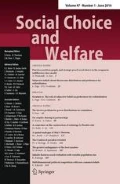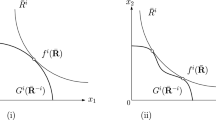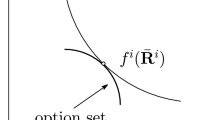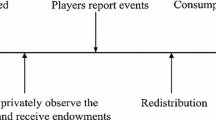Abstract
“Strategy-proofness” is one of the axioms that are most frequently used in the recent literature on social choice theory. It requires that by misrepresenting his preferences, no agent can manipulate the outcome of the social choice rule in his favor. The stronger requirement of “group strategy-proofness” is also often employed to obtain clear characterization results of social choice rules. Group strategy-proofness requires that no group of agents can manipulate the outcome in their favors. In this paper, we advocate “effective pairwise strategy-proofness.” It is the requirement that the social choice rule should be immune to unilateral manipulation and “self-enforcing” pairwise manipulation in the sense that no agent of a pair has the incentive to betray his partner. We apply the axiom of effective pairwise strategy-proofness to three types of economies: public good economy, pure exchange economy, and allotment economy. Although effective pairwise strategy-proofness is seemingly a much weaker axiom than group strategy-proofness, effective pairwise strategy-proofness characterizes social choice rules that are analyzed by using different axioms in the literature.
Similar content being viewed by others
References
Barberà S, Jackson M (1995) Strategy-proof exchange. Econometrica 63:51–87
Barberà S, Massó J, Serizawa S (1998) Strategy-proof voting on compact ranges. Game Econ Behav 25:272–291
Benassy JP (1982) The Economics of market disequilibrium. Academic, New York
Ching S (1994) An alternative characterization of the uniform rule. Soc Choice Welfare 11:131–136
Ded R, Ohseto S (1999) Strategy-proof and individually rational social choice functions for public good economies: a note. Econ Theory 14:685–689
Gibbard A (1977) Manipulation of voting schemes: a general result. Econometrica 45:439–446
Hurwicz L (1972) On Informationally Decentralized Systems. In: McGuire CB, Radner R (eds) Decision and organization. North Holland, Amsterdam, pp 297–336
Maskin E (1999) Nash equilibrium and welfare optimality. Rev Econ Stud 66:23–38
Moulin H (1980) On strategy-proofness and single-peakedness. Publ Choice 35:437–455
Moulin H (1994) Serial cost sharing of excludable public goods. Rev Econ Stud 61:305–325
Musgrave (1985) A brief history of fiscal doctrine. In: Auerbach AJ, Feldstein M (eds) Handbook of public economics vol. I. North-Holland, Amsterdam, pp 1–59
Ohseto S (1997) Strategy-proof mechanism in Public Good Economies. Math Soc Sci 33:157–183
Peleg B, Sudhölter P (1999) Single-peaked and coalition proofness. Rev Econ Design 4:381–387
Samuelson P (1954) The pure theory of public expenditures. Rev Econ Stat 36:387–389
Satterthwaite M (1975) Strategy-proofness and arrow’s conditions: existence and correspondence theorems for voting procedures and social welfare functions. J Econ Theory 10:187–217
Satterthwaite M, Sonnenschein H (1981) Strategy-proof allocation mechanisms at differentiable points. Rev Econ Stud 48:587–598
Schummer J (1997) Strategy-proofness versus efficiency on restricted domains of exchange economies. Soc Choice Welfare 14:47–56
Schummer J (2000) Manipulation through Bribes. J Econ Theory 91:180–198
Serizawa S (1996) Strategy-proof and individually rational social choice functions for public good economies. Econ Theory 7:501–512
Serizawa S (1999) Strategy-proof and symmetric social choice functions for public good economies. Econometrica 76:121–145
Serizawa S (2002) Inefficiency of strategy-proof rules for pure exchange economies. J Econ Theory 106:219–241
Serizawa S, Weymark J (2003) Efficient strategy-proof exchange and minimum consumption guarantees. J Econ Theory 109:246–263
Sprumont Y (1991) The division problem with single-peaked preferences: a characterization of the uniform rule. Econometrica 59:509–519
Zhou L (1991) Inefficiency of Strategy-proof allocation mechanisms in pure exchange economies. Soc Choice Welfare 8:247–257
Author information
Authors and Affiliations
Corresponding author
Rights and permissions
About this article
Cite this article
Serizawa, S. Pairwise Strategy-Proofness and Self-Enforcing Manipulation. Soc Choice Welfare 26, 305–331 (2006). https://doi.org/10.1007/s00355-006-0099-x
Received:
Accepted:
Published:
Issue Date:
DOI: https://doi.org/10.1007/s00355-006-0099-x




